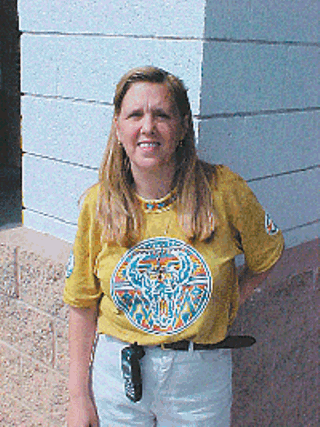Give me the Cliff's Notes on the Giving Tree.
We provide food, referrals, case management, counseling, clothing, toiletries and social services for homeless and needy children and families. We also help elderly and disabled individuals.
How many people are you currently helping?
We're helping 800 people a month who come to our feeding program on Thursday nights. Twelve children live at the Grace Home, with 10 of those there all the time. We do referrals and case management for another 40 or 50 people a week who call in for various things.
That sounds like a lot of work. How many people are with the organization?
There's not one paid person with the Giving Tree, unless you count room and board for the house parents at the Grace Home, which I don't, seeing as they have to watch 12 kids. There are more than 100 volunteers, and they range in age from 10 to 94. (The 94-year-old) comes to help at our feeding program.
How many homeless kids are there in Tucson?
According to a recent report, there are 2,100.
Wow. What causes a child to become homeless?
I'd say the No. 1 thing is domestic violence. No. 2 is eviction due to some kind of breaking in the family. Drugs are the other big cause.
What happens if these kids don't get helped?
They go hungry. And it's much worse in the summer months, when school's out, because they don't even get the two good meals they get in school (with the school lunch program).
Giving Tree is faith-based. What does that mean in terms of your services?
We do not discriminate against any type of person whatsoever in our programs. But our funding sources are primarily from private individuals who don't believe the government has any business raising children. We allow total religious freedom for our children and our house parents. Nobody's beating people over the head with a Bible. I really want to stress that. There is no one particular church or denomination helping us. We have the whole range of people. Most of the people who provide support have had a first-hand experience with poverty or homelessness.
You've just given me a bunch of ways that faith does not play a factor. How does faith become involved?
Well, at the Grace Home, we pray. We have sermons on our land, the same land we use for our feeding program Thursday night. We provide breakfast at those (Sunday) sermons. People call it "Church on the Lot" and it's done by the Tucson Area Christian Fellowship. They also come on Thursday night, and if anybody needs prayer, they're there. A lot of the people seem spiritually lost because of the failures of what we call "organized churches." This doesn't look like a church.
Has the faith element ever caused you any problems?
No, not ever, in all the years of the feeding program or the Grace Home, because we don't push it on anybody. We're giving unconditionally. People don't have to sing hymns. We don't do anything like that. I will say that's not the case with most faith-based programs, however.
How much do you spend a year?
This part is gonna knock your socks off. Our annual budget is $13,000. The rest is donated. We have donated office space, a donated receptionist--all volunteers. We need to pay the utilities at the Grace Home and pay for stuff for the children. There's also insurance and gas--that's a big one right now. We also spend $100 a week buying food from the Food Bank.
Wait. You have to buy food from the Food Bank?
Mollie Moody, director of development: Yeah. They take donated food and sell it back for 22 cents a pound.
Wow. That's weird. Well, if you could tell people one thing about homeless children in Tucson, what would it be?
Wright-Giovingo: I want them to know that there are children right here in our backyard going without food and clothing and shoes. At least five kids a month are coming to the feeding program needing shoes. Society's so focused on helping children all around the world, but they don't see what's going on in their own backyard.





